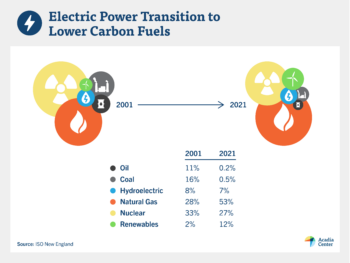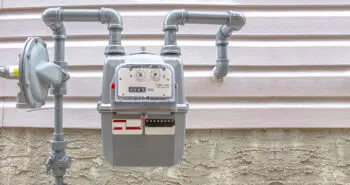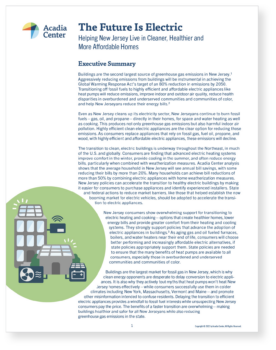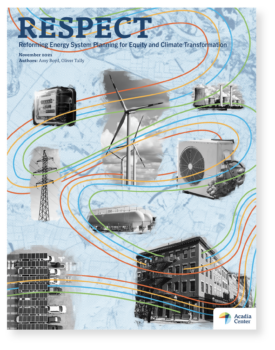The Conduit
Dear Friend,
Welcome to the first edition of “The Conduit,” Acadia Center’s newsletter for our donors and supporters. Acadia Center has been on the frontline of the climate fight for nearly 25 years, and our work is only possible through our partners like you. We’re launching this newsletter to pull back the curtain and give you a special insider look at our current efforts in local communities, states, throughout the region and beyond, rippling through the entire country’s climate efforts.
This first edition focuses on thought leadership, highlighting work to move beyond fossil fuels. We take a deeper dive into our data-driven research and the actionable findings we bring to stakeholders throughout the northeast and beyond. Finally, we point to recent efforts to maintain the progress made as too often various entities seek to chip away at important climate advances.
Acadia Center envisions a clean energy future that will improve quality of life for everyone while lowering greenhouse gas emissions that are rapidly pushing the climate towards an unstable and dangerous state. Our work in the region provides a precedent for national action and makes a real difference at the community level. Your support makes all this possible, and we are grateful that you’ve chosen to be part of the team. Thank you and we hope you enjoy this exclusive look at our work.
Sincerely,

Daniel L. Sosland, President

Acadia Center Leadership
Acadia Center creates policies to replace fossil fuels with cleaner, safer, and cost-effective alternatives. We press for change with energy companies and decision-makers, working behind the scenes, alongside diverse partners, and with media and public-facing materials.
Tackling Barriers to Clean Energy Solutions:
Confronting Obstacles Created by the Regional Power Grid
 Acadia Center has been challenging policies and governance structures at ISO-New England, the entity that operates the multi-billion-dollar regional energy grid paid for by ratepayers. Acadia Center has long worked to identify ways that ISO policies, funding approaches, and planning favor fossil fuel resources over viable clean energy options. One such rule in this world of acronym soup is called MOPR – the Minimum Offer Price Rule. MOPR pays gas power plant generators extra on the ratepayer’s dime to stay in the market – intentionally insulating and subsidizing gas generators from competition from wind and solar energy. Despite an initial decision to phase MOPR out in response to efforts by Acadia Center and partners, ISO-NE made a last-minute switch to delay the elimination of MOPR for years. Acadia Center raised attention about the indefensibility of MOPR with media, decision-makers, and community groups. From presentations to local groups like the League of Women Voters, to sharing knowledge with regional coalitions like New England for Offshore Wind (NE4OSW), to speaking alongside U.S. Senator Ed Markey outside the offices of ISO-NE, Acadia Center’s expertise and recommendations are having a broad impact. We intend to stay at it until clean energy barriers like MOPR are removed.
Acadia Center has been challenging policies and governance structures at ISO-New England, the entity that operates the multi-billion-dollar regional energy grid paid for by ratepayers. Acadia Center has long worked to identify ways that ISO policies, funding approaches, and planning favor fossil fuel resources over viable clean energy options. One such rule in this world of acronym soup is called MOPR – the Minimum Offer Price Rule. MOPR pays gas power plant generators extra on the ratepayer’s dime to stay in the market – intentionally insulating and subsidizing gas generators from competition from wind and solar energy. Despite an initial decision to phase MOPR out in response to efforts by Acadia Center and partners, ISO-NE made a last-minute switch to delay the elimination of MOPR for years. Acadia Center raised attention about the indefensibility of MOPR with media, decision-makers, and community groups. From presentations to local groups like the League of Women Voters, to sharing knowledge with regional coalitions like New England for Offshore Wind (NE4OSW), to speaking alongside U.S. Senator Ed Markey outside the offices of ISO-NE, Acadia Center’s expertise and recommendations are having a broad impact. We intend to stay at it until clean energy barriers like MOPR are removed.
Stopping Fossil Gas Expansion

Acadia Center is immersed in fighting against proposals to increase the use of fossil (commonly called “natural”) gas. Fossil gas use for heating buildings poses one of the largest risks to the climate and to public health and safety. Fossil gas is mostly comprised of methane, a potent greenhouse gas that leaks into the atmosphere at every stage of its journey, from generation to interstate transmission and distribution through local pipelines. Methane leaks are particularly problematic in the Northeast’s aging distribution systems, parts of which are antique underground pipes dating back to the Civil War. Acadia Center met with Massachusetts Attorney General Maura Healey’s Office regarding regulatory approaches to address the future of the natural gas utility. Our leadership in forming the Beyond Gas coalition and recommendations to transform utility oversight have been influential in the Attorney General’s Office’s pressing for a comprehensive approach to the future of gas in the state.
Crunching the Numbers
Acadia Center’s foundational work analyzes reliable data to chart long-term pathways that address climate change. Our data analyses have widespread applicability from local communities to multi-state action and as a role model for national action.
“PowerHouse”: Uncovering the Benefits of Healthy Buildings
 Efforts to transition older buildings from fossil fuels to modern, clean, electric options like air source heat pumps often face questions about the cost, effectiveness, and viability of new technologies. To help provide needed information, Acadia Center undertook a project to fill a gap in analysis and information regarding the real costs and benefits of eliminating fossil fuel use in specific types of single and multifamily homes. This tool, called PowerHouse, allows for a locally relevant analysis of operating costs, electricity consumption, and emissions that is both detailed and state-specific. To advance the goals of a clean building heating coalition, the New Jersey Conservation Foundation commissioned a report by Acadia Center. This new report, “The Future is Electric”, shows that, when combined with weatherization, New Jerseyans will save money and improve indoor air quality by electrifying their homes. New Jersey can make buildings healthier and safer while greatly reducing greenhouse gas emissions and saving money on energy bills.
Efforts to transition older buildings from fossil fuels to modern, clean, electric options like air source heat pumps often face questions about the cost, effectiveness, and viability of new technologies. To help provide needed information, Acadia Center undertook a project to fill a gap in analysis and information regarding the real costs and benefits of eliminating fossil fuel use in specific types of single and multifamily homes. This tool, called PowerHouse, allows for a locally relevant analysis of operating costs, electricity consumption, and emissions that is both detailed and state-specific. To advance the goals of a clean building heating coalition, the New Jersey Conservation Foundation commissioned a report by Acadia Center. This new report, “The Future is Electric”, shows that, when combined with weatherization, New Jerseyans will save money and improve indoor air quality by electrifying their homes. New Jersey can make buildings healthier and safer while greatly reducing greenhouse gas emissions and saving money on energy bills.
A Bold New Vision for Utility Planning
 Our new report, “RESPECT – Reforming Energy System Planning for Equity and Climate Transformation” has been gaining attention throughout the region. RESPECT takes on one of the thorniest challenges in current clean energy policy: fashioning a responsible approach to utility and energy planning that pivots to a world where energy companies must advance a consumer-friendly clean energy future that benefits all, rather than prioritize their revenue return based on outdated incentives. Acadia Center’s RESPECT framework outlines key reforms that would ensure that utility investments and decision-making are aligned with state goals to address climate pollution, further environmental justice, and lower consumer costs. Since its release, RESPECT ideas are rapidly moving from framework to action, as legislators in Massachusetts and Maine and regulators in Connecticut are embracing these ideas to inform new plans and policies which will move the region forward towards a clean energy future.
Our new report, “RESPECT – Reforming Energy System Planning for Equity and Climate Transformation” has been gaining attention throughout the region. RESPECT takes on one of the thorniest challenges in current clean energy policy: fashioning a responsible approach to utility and energy planning that pivots to a world where energy companies must advance a consumer-friendly clean energy future that benefits all, rather than prioritize their revenue return based on outdated incentives. Acadia Center’s RESPECT framework outlines key reforms that would ensure that utility investments and decision-making are aligned with state goals to address climate pollution, further environmental justice, and lower consumer costs. Since its release, RESPECT ideas are rapidly moving from framework to action, as legislators in Massachusetts and Maine and regulators in Connecticut are embracing these ideas to inform new plans and policies which will move the region forward towards a clean energy future.
Protecting Progress
With almost 25 years of experience in the region, Acadia Center stands firm against efforts to undermine the headway we’ve made for a livable climate and a stronger, more equitable economy.
Rapid Response to Protect Consumers from Efficiency Funding Rollbacks
When Acadia Center learned that an effort was underway in Connecticut to sweep $900,000 out of the Energy Efficiency Fund, we sprang into action. Acadia Center knows the importance of keeping these funds safe for important efficiency efforts that support communities impacted the most by climate change, instead of diverting them to upgrade the current utility’s structure. We immediately convened a group of energy advocates to organize a full-court press to stop the raid. The next morning, after many conversations, intelligence gathering, and lobbying, the raid was defeated, and the fund is safe for now. Unfortunately, this is only the latest in a long series of efforts to raid efficiency funds in Connecticut, Rhode Island, and elsewhere. These raids damage one of the best tools to help consumers improve the energy quality of their homes and businesses – and one of the most effective climate programs in place. We will be vigilant to protect consumer and ratepayer dollars and ensure these funds are used for their intended purpose.
Helping Rhode Island Lead the Nation in EVs
Acadia Center intervened in Rhode Island’s latest utility rate case which, among other things, forged a path for the state’s nation-leading Electric Vehicle (EV) charging rollout. Following Acadia Center’s efforts to negotiate a settlement in the case, we were appointed to the Electric Transportation Subcommittee of the state Power Sector Transformation Advisory Group which has advised the deployment of hundreds of EV charging stations across the state, including in environmental justice communities and multi-family developments. As the world’s automakers rapidly transition away from internal combustion engines to fully electric vehicles over the next decade, Rhode Island seeks to be at the forefront, making sure the necessary infrastructure gets built to facilitate that shift.
Spreading the Message
A vital part of Acadia Center’s mission is advocating for clean energy solutions and getting the word out about our findings. This year we expanded our communication efforts to reach new audiences.
![]()
“‘If approved, it would slow New England’s ability to meet state climate goals, exacerbate climate pollution already impacting our communities and our economy, and cost consumers money they can ill afford,’ said Melissa Birchard, a senior regulatory attorney for the Acadia Center,”
– A Decision Made Behind Closed Doors May Set Clean Energy Back by Two Years
The Boston Globe
![]()
““A heat pump is probably the biggest thing that consumers can do to help fight the climate crisis,’ said Amy Boyd, director of policy for the Acadia Center,”
– A Heat Pump Might Be Right for Your Home. Here’s Everything to Know.
Wirecutter
![]()
“Energy efficiency has long been and will continue to be the lowest-cost and simplest way to reduce our energy insecurity and keep electric rates in check.”
– Opinion/Webster: Only one way for RI to get off fossil fuel roller coaster
Providence Journal



















